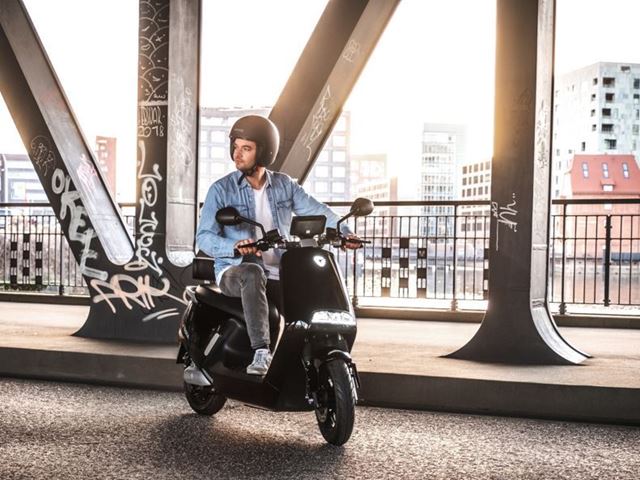
- Latest: Welcome to Auto Futures - Mobility News, Features, Exclusives and More...
- Latest: Subaru Europe Unveils the Brand's First All-Electric Compact SUV
- Latest: Lucid, Nuro & Uber Partner on Next-Generation Autonomous Robotaxi Service
- Latest: GM & Redwood Materials to Repurpose EV Batteries for Energy Storage
- Latest: Stellantis Discontinues Hydrogen Fuel Cell Technology Development Program
- Latest: Paving the way for an Electrified Future - L-Charge CEO
Shared Micro-Mobility is a "Trend That is Still at the Beginning" - Wunder Mobility CEO Gunnar Froh
Adrian Smith
- Nov 03 2022

Over the last few years shared micromobility operators have faced a number major challenges. Coronavirus hit the market hard, particularly in the early stages of the pandemic, and some operators have struggled financially on the path to profitability. But help is at hand from companies such as Germany's Wunder Mobility.
"Our mission is to accelerate the transition to sustainable mobility by enabling local and regional operators to launch and scale shared mobility solutions," Gunnar Froh, founder and CEO at Wunder Mobility, tells Auto Futures.
Froh has been in the car sharing business since 2007.
"In 2014, Wunder Mobility pioneered ride-sharing in Germany. In 2018 we launched our B2B SaaS platform for vehicle sharing. Since then, we have become the clear market leader in software for shared micromobility, a market growing at 30-50% per year," he says.
"Shared mobility is an intensely local, operations-heavy business. It takes thousands of local entrepreneurs to bring shared mobility into the mainstream. Bird’s announcement to leave many key European markets is an important case in point," he explains. In October, 2022, Bird made the decision to withdraw from Germany, Sweden and Norway.
"Our technology empowers these entrepreneurs worldwide to access the latest technology at a fraction of the cost of in-house development. Our solutions extend into both software and hardware to address an operator’s key challenges that cannot be solved on a local level."
In 2020, Wunder announced a partnership that was a major milestone in its transition from being a pure software company to a becoming a one-stop mobility company. The collaboration was with China’s YADEA, the world’s largest manufacturer of light electric vehicles. The first vehicle that emerged was the Yadea G5, a sharing-ready, electric moped that offers up to 60 kms on a single charge.
"We have a long-standing and exclusive partnership with YADEA to deliver highly reliable e-biked and e-mopeds into the sharing market. These vehicles are designed, tested and distributed by Wunder and manufactured by YADEA," says Froh.
"The end-user experience and the operator efficiency are heavily impacted by both the software and hardware. Working with dozens of operators on the software side has allowed us to build deep domain expertise on hardware as well. Over the last three years, we have built our own hardware organization and are designing e-bikes and e-mopeds for sharing in collaboration with leading manufacturers to provide our customers and their end-users with a high-quality end-to-end experience," he adds.

Operating on Five Continents
Wunder is still growing. It recently announced additional funding of EUR 12 million from its investors, including Blumberg Capital. This additional funding will go towards supporting its engineering and technical support teams.
"Wunder Mobility is the best solution for ambitious operators that have the clear goal of becoming a regional champion, operating thousands and eventually tens of thousands of vehicles. Our funding goes towards building out our leadership position in the enterprise segment of our market: a robust and feature-rich software solution that is easy to customize and integrate and comes with deeply knowledgeable support provided seven days a week," says Froh.
David Blumberg, founder and managing partner at Blumberg Capital, comments: “Technology-driven advancements in shared mobility services positively impact individuals, businesses and society as mobility becomes more efficient, accessible and sustainable. Vehicle sharing operators have a choice in how they approach technology investments. They can take on time and cost-intensive software development and hardware sourcing or they can leverage a proven technology platform like Wunder Mobility to accelerate new products or scale existing offerings.”
The Hamburg-based company also has plans to grow its business beyond Europe.
"Wunder has a global client base serving operators on five continents. Our solution has grown in Europe which is in many ways the toughest but also the biggest market for vehicle sharing. We are serving US clients in their time zone and with in-person visits just as we are anywhere else."

Strong Tailwinds for a "Transition Towards Shared Micro-mobility"
Despite bumps along the road, Wunder says growth rates in the shared mobility sector are expected to remain high in the coming years.
"After some interruptions earlier in the pandemic following lockdowns and work-from-home orders, shared mobility has grown significantly beyond pre-pandemic levels today. One example is moped sharing in Europe is up +57% in the first half of 2022 over the previous year," says Froh.
"The vast majority of people are back to commuting all or at least most days of the week. Traffic data is documenting traffic volumes at pre-pandemic levels. Cities are looking to transition to light electric vehicles and shared solutions are in many cases more convenient and more economical than ownership."
"These are strong tailwinds for a transition towards shared micro-mobility, a trend that is still at the beginning," he adds.
Finally, we asked Froh what urban mobility will look like by 2030.
"In 2030, most cities will have more restrictions on cars than they do today. More people than now will use a portfolio of transportation options to cover their weekly mobility needs. Active forms of mobility like bikes are going to play a larger role and shared mobility solutions will be available to most people living in urban areas and will be closely integrated with public transport systems," he predicts.
Popular Categories
